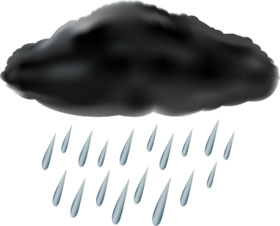Have you ever, as a kid, tried to catch a raindrop or snowflake, only to be scolded at: "That could be acid rain!"
Experts claim that all rain is actually acidic since the precipitation binds with carbon dioxide. But, the term 'acid rain' was coined from certain air pollutants merging. Sulfur dioxide combines with nitrogen oxides and reacts to the oxygen in the air is what makes sulfuric acid, which causes the acid precipitation- rain, snow, or fog. Sulfur dioxide comes from industrial smelters and coal-burning plants. Nitrogen oxides come from car exhaust systems and can even be created by lightning.

It was found that while acidic precipitation does not affect human health directly; some particle matter associated with it has shown adverse health effects, particularly among those with respiratory disorders. There is also concern surrounding the idea that acid rain could draw mercury from the ground, which could then be carried by runoff into bodies of water. Despite these findings, however, a ten-year study on acid rain revealed the effects are not as damaging as first thought, causing mainly aesthetic damage to buildings, changing the chemical balance of lakes and streams, and also affecting some fish species. These are all reasons for concern, for example, we do not want monuments and other outdoor sites to be destroyed. Paint, iron, zinc, and steel structures are most likely to be affected. However, at least we know as humans we should not be scared as we once were.
The Clean Air Act of 1990 has made positive strides in reducing the number of sulfur dioxides in the air. The government now regulates the amount of these chemicals that can be released into the air. Also, since this problem affects the Northeast more so than other parts of the country, the government is also working with Eastern Canada to help eliminate the toxins from the air. Each state has an allowance they can release each year.Acid raid doesn't do too much to affect the water supply. However, some folks, either at home if they do not have a well or when camping, use the rainwater catch method. Obviously, drinking water right after it is collected would be a bad idea. Boiling the water and perhaps using a disinfectant will make the water safe for consumption. Other than that, if water supplies are coming from a lake or stream that has acid rain buildup, chances are, the local water company is monitoring the pH levels for the acidity of the supply. If there were a threat, they would instill a boiling alert. Also, coupled with the water supply's treatment system, having a home filtration system will be an extra hand against the acidic contaminants. Finally, if you have well water, you are likely to be contaminated. When you get your annual tests done on your water, you will be able to tell if the pH level has risen.Acid rain continues to be an understudy. New facts are found out every day. Stay tuned to your local water company's website or the EPA site for the latest information. Especially if you live in the industrial Northeast.Read Next: Toxic water: A guide to acid rain



